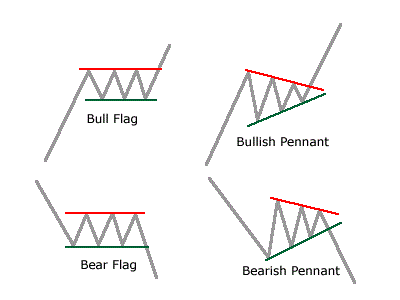
Analysing Chart Patterns: Flags & Pennants
We’re going to cover the next patterns in our TA series, Flags & Pennants, both of which are Forex continuation patterns.
Flags and pennants form when price rallies, consolidates sideways or retraces slightly, and then continues in its previous direction. This consolidation period takes the shape of a rectangle (flag) or a small triangle (pennant). When identifying flags or pennants, traders should draw trendlines along the highs and lows of the consolidation/retracing phase. The steep rise leading up to the flag or pennant is known as the ‘flag pole’.
Typically, this flag or pennant pattern is followed by another steep rise in price. And that’s exactly where the trade opportunity exists. As soon as price breaks out above the flag/pennant upper trendline, it’s time to enter a long trade. The opposite occurs for bearish flags/pennants, the only difference is that instead of a sharp rise, preceding price action is a sharp fall.
When trading flags & pennants, traders can place their stops above/below the high/low of the pennant/flag, depending on whether it’s a bullish or bearish setup.
When determining your target area, we use the height of the flag pole and add that to the breakout area to provide a potential target. The idea with flag/pennant patterns in the Forex market is that there is already significant momentum shown in the previous swing, so we can expect that momentum to continue after a momentary consolidation.
Fast & easy account opening
-
Register
Choose an account type and submit your application
-
Fund
Fund your account using a wide range of funding methods.
-
Trade
Access 300+ CFD instruments across all asset classes on MT4 / MT5
That's it, it's that easy to open a Forex and CFD trading account.
Welcome to the world of trading!
open live account


About us
Vantage is a global, multi-asset broker offering clients access to a nimble and powerful service for trading CFDs on Forex, Commodities, Indices, Shares, and Cryptocurrencies.
With more than 10 years of market experience and headquartered in Sydney, Vantage now has over 1,000 staff across more than 30 global offices.
Vantage is more than a broker. It provides a trusted trading ecosystem that enables clients to achieve their own success, in a faster and simpler manner.
Be empowered to better capitalise on winning market opportunities when you trade smarter @vantage.
Contact us
+44 2080 363 883
71 Fort Street, 3rd Floor, George Town, Grand Cayman, Cayman Islands, KY1-1111.
Registration Number: 323723
Vantage is a trading name of Vantage International Group Limited trading under Vantage, is authorised and regulated by the Cayman Islands Monetary Authority (CIMA), Securities Investment Business Law (SIBL) number 1383491 and is registered at Artemis House, 67 Fort St, PO Box 2775, Grand Cayman KY1-1111.
Risk Warning: Trading derivatives carries significant risks. It is not suitable for all investors, and if you are a professional client, you could lose substantially more than your initial investment. When acquiring our derivative products, you have no entitlement, right or obligation to the underlying financial assets. Past performance is no indication of future performance, and tax laws are subject to change. The information on this website is general and doesn't consider your personal objectives, financial circumstances, or needs. Accordingly, before acting on the advice, you should consider whether the advice is suitable for you, considering your objectives, financial situation, and needs. We encourage you to seek independent advice if necessary. Please read our legal documents and ensure you fully understand the risks before making any trading decisions.
The information on this site and the products and services offered are not intended for distribution to any person in any country or jurisdiction where such distribution or use would be contrary to local law or regulation.
While the Authority has granted a securities or derivatives investment business licence to the Licensee, the Authority does not endorse or vouch for the merits of the products offered by the Licensee.
Copyright © 2024 Vantage. All rights reserved.






